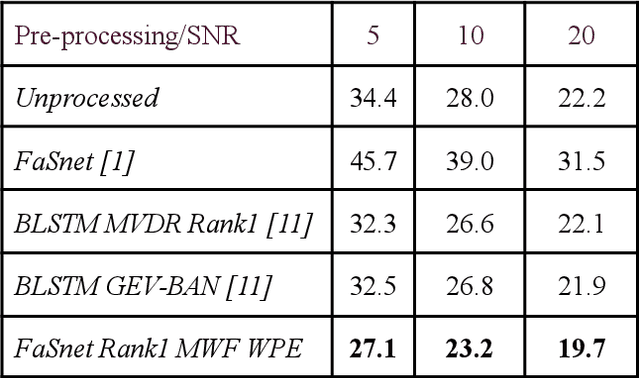Sandipana Dowerah
MULTISPEECH
Self-supervised learning with diffusion-based multichannel speech enhancement for speaker verification under noisy conditions
Jul 05, 2023Abstract:The paper introduces Diff-Filter, a multichannel speech enhancement approach based on the diffusion probabilistic model, for improving speaker verification performance under noisy and reverberant conditions. It also presents a new two-step training procedure that takes the benefit of self-supervised learning. In the first stage, the Diff-Filter is trained by conducting timedomain speech filtering using a scoring-based diffusion model. In the second stage, the Diff-Filter is jointly optimized with a pre-trained ECAPA-TDNN speaker verification model under a self-supervised learning framework. We present a novel loss based on equal error rate. This loss is used to conduct selfsupervised learning on a dataset that is not labelled in terms of speakers. The proposed approach is evaluated on MultiSV, a multichannel speaker verification dataset, and shows significant improvements in performance under noisy multichannel conditions.
How to Leverage DNN-based speech enhancement for multi-channel speaker verification?
Oct 17, 2022
Abstract:Speaker verification (SV) suffers from unsatisfactory performance in far-field scenarios due to environmental noise andthe adverse impact of room reverberation. This work presents a benchmark of multichannel speech enhancement for far-fieldspeaker verification. One approach is a deep neural network-based, and the other is a combination of deep neural network andsignal processing. We integrated a DNN architecture with signal processing techniques to carry out various experiments. Ourapproach is compared to the existing state-of-the-art approaches. We examine the importance of enrollment in pre-processing,which has been largely overlooked in previous studies. Experimental evaluation shows that pre-processing can improve the SVperformance as long as the enrollment files are processed similarly to the test data and that test and enrollment occur within similarSNR ranges. Considerable improvement is obtained on the generated and all the noise conditions of the VOiCES dataset.
 Add to Chrome
Add to Chrome Add to Firefox
Add to Firefox Add to Edge
Add to Edge